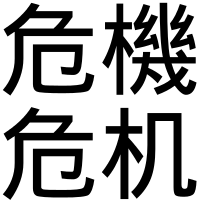Chinese word for "crisis"
The Chinese word for "crisis" (simplified Chinese: 危机; traditional Chinese: 危機; pinyin: wēijī, wéijī[1]) is frequently invoked in Western motivational speaking as being composed of two Chinese characters signifying "danger" and "opportunity" respectively. While the original meaning of wēijī is "danger at a point of juncture," and many linguists and native Chinese speakers highlight the errors in its Western reinterpretation, the term's "danger-plus-opportunity" meaning has been so widely used by politicians, businesspeople, and in popular culture that its alternative etymology has been picked up all over the world, including by some native Chinese speakers.
| Crisis | |||||||||
|---|---|---|---|---|---|---|---|---|---|
 | |||||||||
| Traditional Chinese | 危機 | ||||||||
| Simplified Chinese | 危机 | ||||||||
| Hanyu Pinyin | wēijī, wéijī | ||||||||
| |||||||||
Western usage
American linguist Benjamin Zimmer has traced mentions in English of the Chinese term for "crisis" as far as an anonymous editorial in a 1938 journal for missionaries in China.[2][3] But its use probably gained momentum in the United States after John F. Kennedy employed this trope in campaign speeches in 1959 and 1960:[3]
In the Chinese language, the word "crisis" is composed of two characters, one representing danger and the other, opportunity.[4]
Referring to the word has since become a staple meme for American business consultants and motivational speakers, as well as gaining popularity in educational institutions, politics and in the popular press. For example, in 2007, Secretary of State Condoleezza Rice applied it during Middle East peace talks.[5] Former Vice President Al Gore has done so numerous times: in testimony before the U.S. House of Representatives Energy and Commerce Committee; in the introduction of An Inconvenient Truth; and in his Nobel Peace Prize acceptance lecture.[6][7]
Benjamin Zimmer attributes the appeal of this anecdote to its "handiness" as a rhetorical device and optimistic "call to action",[8] as well as to "wishful thinking".[9]
Popular mistranslation
The primary meaning of the second character in wēijī, pronounced jī, (机; 機) is not "opportunity".[3][10] Sinologist Victor H. Mair of the University of Pennsylvania states the popular interpretation of wēijī as "danger" plus "opportunity" is a "widespread public misperception" in the English-speaking world.[9] While the first character wēi (危) does indeed mean "dangerous" or "precarious", the second character is highly polysemous and does not, in isolation, translate as "opportunity".[9] The confusion likely arises from the fact that the character for jī is a component of the Chinese word for "opportunity", jīhuì (機會; 机会, literally "meeting a critical point").
According to the 10th edition of Xinhua Zidian, the best-selling Chinese dictionary considered authoritative in China, the character 机/機 (jī) has multiple meanings:[11]
- Meaning 1. "a point where things happen, change", examples: 危机 (wēijī), [...]
- Derivative Meaning 1.1. "an event that has a confidential nature", examples: [...]
- Derivative Meaning 1.2. "chance (opportunity), good timing", examples: [...]
- Meaning 2.[...]
- [...]
Therefore, it could be somewhat misleading and biased to translate 机 (jī) in the context of the word wēijī to "opportunity" instead of "a changing point" or "a confidential event".
See also
References
- 教育部重編國語辭典修訂本 (in Chinese). Retrieved November 7, 2019.
字詞 【危機】 注音 ㄨㄟˊ ㄐㄧ 漢語拼音 wéi jī
- Chinese Recorder (January 1938, "The Challenge of Unusual Times")
- Zimmer, Benjamin (March 27, 2007). "Crisis = danger + opportunity: The plot thickens". Language Log. Retrieved January 19, 2009.
- Speeches by President Kennedy at United Negro College Fund fundraiser, Indianapolis, Indiana, 12 April 1959, and Valley Forge Country Club, Valley Forge, Pennsylvania, 29 October 1960
- Kessler, Glenn (January 19, 2007). "Rice Highlights Opportunities After Setbacks On Mideast Trip". The Washington Post. p. A14. Retrieved December 12, 2007.
- "Archived copy" (PDF). Archived from the original (PDF) on March 4, 2016. Retrieved October 13, 2015.CS1 maint: archived copy as title (link)
- Gore, Al (December 10, 2007). "Al Gore: The Nobel Peace Prize 2007: Nobel Lecture". Oslo: Nobel Foundation. Retrieved December 12, 2007.
- Zimmer, Benjamin (March 22, 2007). "Stop Him Before He Tropes Again". Language Log. Retrieved January 19, 2009.
- Mair, Victor H. (2005). "danger + opportunity ≠ crisis: How a misunderstanding about Chinese characters has led many astray". PinyinInfo.com. Retrieved January 15, 2009.
- "The Straight Dope: Is the Chinese word for "crisis" a combination of "danger" and "opportunity"?"
- Xinhua Zidian (in Chinese) (10th revised, large-print ed.). Beijing: Commercial Press. 2004. p. 205. ISBN 7-100-02893-0.
❶事物发生、变化的枢纽:生~.危~.转~.(引)1.对事情成败有保密性质的事件:军~.~密.~要.2.机会,合宜的时候:随~应变.勿失良~.好时~.[...]. image. Translation: ❶ a point where things happen, change. e.g. 生机, 危机, 转机. Derivation1. an event that has a confidential nature which can lead to success or failure. e.g. 军机, 机密, 机要. Derivation2. chance (opportunity), good timing. e.g. 随机应变, 勿失良机, 好时机[...]